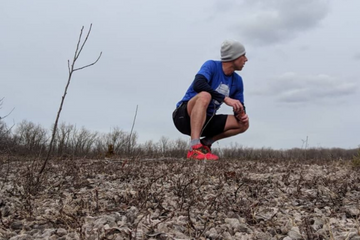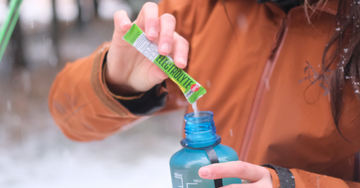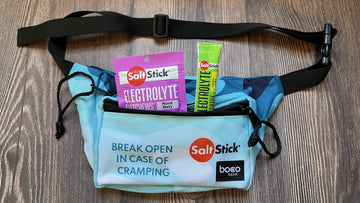How Firefighter Brian Hackenburg Lost 50 Pounds and Transformed into a Fitness Role Model
Jan 15, 2021

When he toes the line at the Boston Marathon this spring, Brian Hackenburg will have raced more than 100 times to promote firefighter fitness.
As a 22-year veteran of the Perkins Twp. Fire Department, Brian relies on an active lifestyle to stay prepared for the physical, mental and emotional demands of being on duty. As a result, the 43-year-old father is known throughout the Ohio community for his commitment to staying fit. He regularly appears in local races of all distances, from 5K’s to marathons, sometimes in full firefighter gear, which can add an extra 50 pounds to his frame.
It’s a far cry from where he started. Nearly 10 years ago, Brian was 50 pounds overweight and suffered the results of an unhealthy lifestyle, which left him at risk for heart disease and inhibited his performance on the front lines. A terrible experience at a local 5K served as a wake-up call.
“I almost passed out after I crossed the finish line,” he says. “I knew then and there it was time for me to make a change.”
According to a 2008 University of Illinois study, nearly 75% of firefighters are overweight, and nearly 50% of in-the-line-of-duty deaths result from heart attack or stroke. Moreover, based on United States Fire Administration (USFA) data, 43.9% of all firefighter fatalities from 1990-2000 were due to cardiac events, nearly doubling the second leading cause of slips, falls and other trauma-related accidents.
“I saw my story in those numbers, and I didn’t want to be just another statistic.”
“I saw my story in those numbers, and I didn’t want to be just another statistic,” Brian says.
After his initial 5K, Brian began exercising regularly and signed up for local races as motivation. As his fitness began to improve, he noticed the changes extended beyond the track and onto the line of duty. Like endurance sports, firefighting is extremely demanding on the human body and can require more than 6,000 calories a day, according to the U.S. National Interagency Fire Center. Moreover, firefighters can lose up to a gallon of water through sweat in 90 minutes, along with critical minerals like sodium and potassium.
“After some bad experiences with cramping, nutrition became a big area of focus for me during my running, but it also paid off on the job,” Brian says. “I quickly learned that in addition to taking in the right sources of calories, I had to pay special attention to my hydration. Water and electrolytes became a fundamental part of my daily routine.”

Although Brian can sweat profusely in a hard training session, he is at greater risk for dehydration on duty. In addition to the extraordinarily hot external temperatures, his fire-protective clothing traps in body heat, which hampers his body’s ability to cool itself through sweating. According to one study, firefighters lose up to five times as much water as athletes in a given period of time. This leaves them at risk for heat exhaustion and decreases in performance that, in dangerous situations, can be harmful or even deadly.
“I always keep SaltStick with me when I’m on the job,” Brian says. “I combine the electrolyte capsules with water and energy drinks to ensure I’m staying as hydrated as possible to keep my performance up.”
Over time, Brian’s dedication to fitness began to pay off. Within a year of his miserable 5K performance, he had run a half marathon.
“I always keep SaltStick with me when I’m on the job. I combine the electrolyte capsules with water and energy drinks to ensure I’m staying as hydrated as possible to keep my performance up.”
“There wasn’t magic to my progress,” he says. “It was just hard work and consistency. I would try and push myself a little bit more each time to build up my endurance.”
Brian also worked to change his approach to nutrition, adopting a healthier diet and adding supplements like SaltStick to support his workout routine. SaltStick is designed to replace the full spectrum of electrolytes lost in sweat—sodium, potassium, calcium and magnesium—in a form the body can easily absorb, which makes it easier to stay hydrated and, more importantly, safe.
One hundred races later, Brian has finished full-length marathons, triathlons and even a handful of Iron-distance races, which extend beyond 140 miles and can last more than 12 hours. He uses fitness to set an example for his two daughters, age 7 and 11, who join him to compete in local races and regularly finish first or second in their age groups.
“My daughters truly are my number one motivator. I train so I can stay and shape and be around for them as long as possible,” Brian says.

His motivations extend beyond family too. Periodically, instead of donning his running kit, Brian will compete in races wearing full firefighter gear to honor a fallen colleague, Jamie Dickman, who was killed during an apartment fire. And as he joins the thousands of runners in Boston this year, he’ll be racing to bring awareness to firefighter suicide.
“I want to keep my brother firefighter’s memory alive and honor his life,” Brian says. “The pain and weight of the firefighter gear is nothing compared to the loss of [Jamie]. Anytime I feel like I want to quit, I think about some of the things he would be saying to me and keep moving forward.”
“My biggest piece of advice is just to get started.”
There are no plans to slow down anytime soon, and Brian hopes his fitness transformation will inspire others who struggle with the challenges he faced 10 years ago.
“My biggest piece of advice is just to get started. From there, just focus on making progress with small steps,” Brian says. “I know our job is demanding, both physically and mentally, but it’s important to remember that people rely on us to do our jobs well. We need to be there for the people we’re helping and for the people at home.”
SaltStick has enjoyed sponsoring Brian’s fitness journey for the past five years, and we look forward to supporting him as he continues to take on new challenges, including the 2020 Boston Marathon. Click here to learn more about how SaltStick can help Fire & Rescue personnel stay hydrated in the line of duty.









